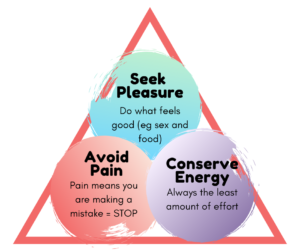With the current COVID-19 pandemic, many of us are finding ourselves at home.
You could be dealing with all kinds of uncertainty.
Am I going to get sick? Is someone I love going to get sick?
What’s going to happen to the economy? Is it going to collapse?!
Is this going to affect my income? What if I can’t pay my bills?!
When are the schools going to open again? How am I going to survive staying home with my family non-stop? Homeschooling?! Seriously?!
How am I going to pass all this time with nothing to do and nowhere to go?
When is this going to end?!
Maybe you’re just bored out of your mind. I for sure have had the thought, “What am I going to eat next?” about a hundred times a day lately.
So many of us turn to food and drink to distract ourselves, comfort ourselves, and deal with our stress or other uncomfortable feelings.
Why? Because it works, if only for a few moments.
But if your blood sugars are sky high and you’re gaining weight, you know this is not working long-term. It has to stop. You have to get a grip.
But how do you do that when you feel completely out of control?
First, understand why you feel out of control
You are eating because it feels good. It’s normal human behavior to want to get out of negative emotion. Your brain is simply doing its job according to its priorities to keep you alive.
The motivational triad drives your decisions in the moment toward seeking pleasure, avoiding discomfort, and conserving energy.
We actually resort to all manner of things in addition to overeating to feel better when we feel bad. This blog post goes into detail more about this.
If you feel a lack of control over yourself, it’s only because you have taught yourself to use food when you are experiencing stress, boredom, or some other unpleasant emotion. If you’ve been overeating like this for a while, it has become automatic.
Your brain has learned to offer this solution in response to these feelings. It’s your go-to way of coping.
And it’s totally normal. You are not alone. The good news is that you can unlearn this behavior.
Second, take back your control
I have a bit of a revelation for you.
It isn’t the pandemic, or the isolation, or homeschooling, or anything else outside of you that is the reason for your stress. 🤨
What?
You might be wondering what the heck I am talking about.
Of course a threat to my health or an economical collapse is causing me stress.
Stay with me here, because this is an important step to taking back control over your stress eating.
Let’s take the example of worrying about getting COVID-19 and dying. Many people look at that possibility and feel anxious.
But not everybody does. Some people feel no threat at all. Some people are carrying on with their lives as if nothing bad could happen.
Some people only feel anxious about COVID-19 when they think of their elderly parents getting sick, or their children. Getting sick themselves isn’t part of their fear and worry.
Why is there such a wide range of emotional response to a life-threatening infection? Because it isn’t COVID-19 that causes your feelings. It’s YOUR THOUGHTS about COVID-19 that cause your feelings.
THOUGHTS cause FEELINGS. And our feelings are what are driving our decision to overeat. So basic –but so powerful — to get right.
The reason this is powerful information is because our thoughts are in our control. We get to choose what we believe or think, but only if we are aware of what we are thinking in the first place.
So, if you are experiencing anxiety or stress and you keep discovering yourself in the pantry or the fridge or dreaming up the next treat you are going to enjoy, notice:
- What are you feeling right now? Name the emotion(s). A feeling is 1 word and it’s NOT hungry.
- What are you thinking about that is causing your anxiety/stress/boredom/negative emotion?
Third, make a decision
Many of us don’t want to take responsibility for our overeating because it’s easier to eat unconsciously. (Remember the conserve energy part of the motivational triad?)
But this is where your power lies.
When you take ownership of your decision to overeat to cover up feeling like crap, and acknowledge the major consequences to continuing with that, you will be facing a decision.
And doing nothing about it is still a decision. You decide to stay the same.
Or, you can decide to stop. For some people, it’s as easy as gaining awareness of how they are making the harmful decision to overeat.
🤯 Oh! I’m eating garbage all day because I’m feeling fear and anxiety about catching COVID-19 and dying!
😮 Oh! I’m drowning myself in ice cream and chocolate because I’m bored and annoyed at my kids all day!
Knowledge and ownership is all it takes for these lucky ones. They change their thoughts and Ta-da! Problem solved!
But for many of us who have deeply ingrained patterns of coping with food, it’s much much harder to change our behavior. 😑
Last, change your patterns
This is where the work lies. Work on yourself is always the most worthwhile work though.
If you’re stuck at home, it might be the perfect time to do it.
It takes getting into your mind and changing those automatic pathways of thoughts, feelings, and actions. Instead of overeating (your action), which is wrecking your blood sugars and making it harder to fit into your pants, you can learn to feel better and to create new ways of dealing with unpleasant emotions.
This looks like:
- Recognizing your queues to overeat.
- “I snack when I’m feeling anxiety or stress.”
- Seeing the thoughts that are triggering feelings that lead to overeating.
- “I feel stressed out whenever I think about all the money I lost in the stock market.”
- Challenging those thoughts to see if you even believe them.
- “It isn’t true that I’m financially ruined and destitute just because we’re in an economical downturn.”
- Finding new thoughts or ways of thinking about the situation that feel better.
- “There’s nothing I can do about it right now anyway. It’s possible that things could turn around just as fast as they went downhill.”
- Notice this pattern and practice your new one until it becomes natural and easy.
There are other things you can do as well to support and care for yourself during a time where your mind goes to worry and stress.
When you take care of yourself, you’re not so exhausted and depleted that you can’t make better decisions.
This can look like:
- Planning and eating real, quality meals that you enjoy and are good for you.
- Avoid snacking and grazing, which wrecks your appetite and leads to more of the same.
- Limiting your exposure to media coverage of crises and catastrophic predictions.
- If it’s important, you’re probably going to hear about it. It doesn’t serve anyone to constantly focus on bad news.
- Exercise in a way that feels energizing, not draining.
- Make it a priority to get enough sleep.
- Your body heals itself during sleep. Hunger and stress hormones regulate better when we’re rested. And if you’re sleeping, you’re not eating, right?
- Spend some time everyday in quiet, soothing surroundings.
- Outside is ideal, but anywhere that gives you peace and brings you into the present moment is therapeutic. Meditation doesn’t have to look like the stereotypical pose. It can be brief and simple awareness of your body, breath, or surroundings.
- Manage your mind by choosing your thoughts intentionally instead of living on default.
- A good place to start is by journaling your thoughts or hiring a coach to show them to you. Once you truly see that your thoughts are driving your feelings and actions, you can understand why you don’t have the results you want in your life.
If you’re really struggling to cope with the uncertainty and changes in your life right now, working with me one-on-one gives you immediate insight and control over your mind and your health.
Don’t hesitate to reach out to me here and I will email you back with times we can connect:



